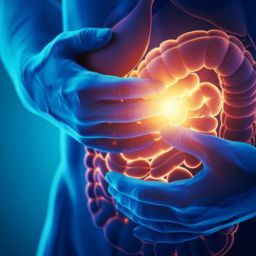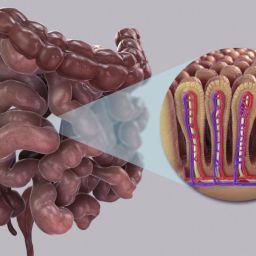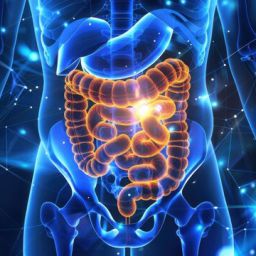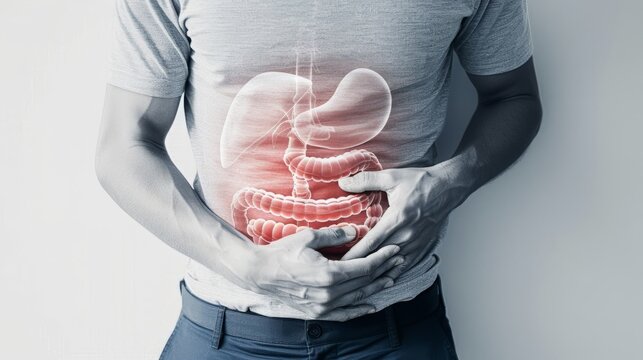
Gas and Bloating in the Small Intestine
What is Gas and Bloating?
- Gas in the digestive system is typically produced when food is broken down in the stomach and intestines. It can also result from the fermentation of undigested carbohydrates in the large intestine. Normally, the body absorbs most of the gas produced in the digestive process, but excess gas can escape through burping or flatulence.
- Bloating refers to the feeling of fullness or distention in the abdomen. It is commonly associated with a sense of pressure, tightness, or discomfort in the stomach. Bloating is often linked to gas buildup in the gastrointestinal (GI) tract, though it can also result from fluid retention or other factors.
While occasional bloating and gas are typically harmless, persistent or severe cases can indicate underlying digestive problems, particularly involving the small intestine.
What Causes Gas and Bloating in the Small Intestine?
Gas and bloating related to the small intestine can result from several causes. Some of the most common include:
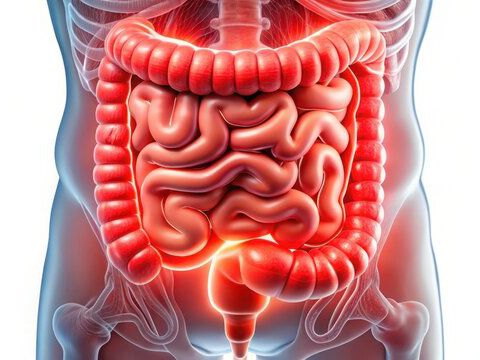
- Small Intestinal Bacterial Overgrowth (SIBO) SIBO occurs when an excessive number of bacteria grow in the small intestine. These bacteria interfere with the normal digestion and absorption of food, causing the fermentation of undigested food and the production of gas. This is one of the most common causes of bloating and excessive gas production.
- Food Intolerances and Sensitivities Certain foods can be difficult for the small intestine to digest, leading to the production of excess gas and bloating. Common culprits include dairy products (lactose intolerance), gluten (in people with celiac disease or non-celiac gluten sensitivity), and specific carbohydrates (as in FODMAP intolerance).
- Irritable Bowel Syndrome (IBS) IBS is a functional GI disorder that affects both the small and large intestines. One of the hallmark symptoms of IBS is bloating, often accompanied by gas, abdominal pain, and changes in bowel movements (diarrhea or constipation).
- Slow Gastric Emptying (Gastroparesis) When food moves slowly through the digestive tract due to impaired motility, it can lead to bloating, discomfort, and excessive gas. Gastroparesis, a condition in which the stomach’s muscles do not contract properly, can contribute to this issue.
- Poor Digestion or Malabsorption When the small intestine cannot properly absorb nutrients from food, due to enzyme deficiencies or other issues, undigested food can ferment in the gut, producing excess gas. Conditions like celiac disease, pancreatic insufficiency, and lactose intolerance fall under this category.
- Stress and Anxiety Psychological stress can affect the gastrointestinal system in various ways, including slowing down digestion, increasing gut sensitivity, and exacerbating bloating and gas. The connection between the brain and gut is often referred to as the “gut-brain axis.”
2: Symptoms and Diagnosis of Small Intestine Gas and Bloating
Symptoms of Gas and Bloating in the Small Intestine
The symptoms of gas and bloating in the small intestine can range from mild to severe. Common signs include:
- Excessive burping or passing gas
- Abdominal distention (feeling of fullness or swelling)
- Frequent bloating or tightness after eating
- Discomfort or pain in the abdomen, often relieved by passing gas or having a bowel movement
- Changes in bowel movements (diarrhea, constipation, or both)
- Nausea, particularly after meals
- Loss of appetite or feeling full quickly after eating
These symptoms can significantly impact quality of life, and in some cases, may lead individuals to seek medical treatment for relief.
How is Gas and Bloating Diagnosed?
To diagnose the underlying causes of excessive gas and bloating, a healthcare provider may conduct a combination of physical examinations, tests, and assessments, including:
- Medical History and Symptom Evaluation: A detailed discussion about the onset, frequency, and triggers of symptoms.
- Breath Tests: Such as the hydrogen breath test, which is commonly used to diagnose SIBO or lactose intolerance.
- Blood Tests: To check for signs of infection, malabsorption, or food allergies.
- Endoscopy: In some cases, a physician may recommend an endoscopy to examine the small intestine and check for abnormalities such as inflammation, ulcers, or structural issues.
- Stool Tests: To rule out infections or parasites that may be contributing to gastrointestinal issues.
3: Effective Methods for Relieving Gas and Bloating
1. Dietary Adjustments
One of the most effective ways to alleviate gas and bloating is through dietary changes. The following strategies can help reduce symptoms:

- Low FODMAP Diet: The Low FODMAP diet involves limiting foods that contain certain carbohydrates (FODMAPs), which are poorly absorbed in the small intestine and can cause gas, bloating, and diarrhea. Common high-FODMAP foods include garlic, onions, beans, dairy, and certain fruits.
- Avoiding Trigger Foods: Identifying specific foods that trigger gas and bloating is key. Common triggers include dairy products (if lactose intolerant), gluten (if sensitive or celiac), processed foods, carbonated beverages, and high-fat foods.
- Smaller, More Frequent Meals: Eating smaller meals more frequently throughout the day can reduce the burden on the digestive system and prevent overeating, which can cause bloating.
- Increasing Fiber Intake: Gradually increasing the intake of fiber, particularly soluble fiber found in foods like oats, apples, and chia seeds, can help with digestion and reduce bloating in the long term.
- Eliminating Artificial Sweeteners: Some sugar substitutes like sorbitol, mannitol, and xylitol can cause gas and bloating because they are poorly absorbed in the small intestine.
2. Probiotics and Gut Health
Probiotics are beneficial bacteria that help maintain a healthy gut microbiome. Taking probiotic supplements or consuming probiotic-rich foods such as yogurt, kefir, and kimchi may help balance the bacteria in the small intestine, improving digestion and reducing bloating and gas.
Specific strains of probiotics, such as Lactobacillus and Bifidobacterium, have been shown to improve symptoms of bloating and abdominal discomfort in individuals with IBS and other digestive issues.
3. Medications and Supplements
Depending on the underlying cause of gas and bloating, medications may be recommended:
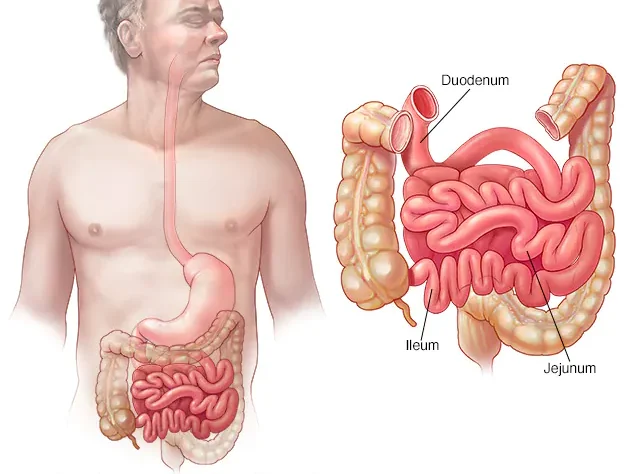
- Antispasmodic Drugs: These medications can help relax the muscles of the intestines, providing relief from bloating and abdominal cramps.
- Digestive Enzymes: If malabsorption is an issue, digestive enzyme supplements can help break down certain foods and improve nutrient absorption, reducing gas and bloating.
- Laxatives or Anti-Diarrheal Medications: If IBS-related constipation or diarrhea is contributing to symptoms, medications that regulate bowel movements can help manage these conditions and ease bloating.
- Activated Charcoal: Some people find relief from bloating and gas by taking activated charcoal, which binds to excess gas in the digestive tract and helps relieve discomfort.
4. Lifestyle Changes
In addition to dietary changes, several lifestyle modifications can help reduce gas and bloating:
- Stress Management: Managing stress through techniques like meditation, deep breathing exercises, and yoga can improve gut function and reduce bloating triggered by stress.
- Regular Exercise: Regular physical activity can stimulate digestion, improve gut motility, and reduce bloating. Activities like walking, swimming, and cycling are particularly beneficial.
- Hydration: Drinking plenty of water helps prevent constipation and improves digestion, which can reduce bloating.
- Sleep and Rest: Ensuring you get enough restful sleep is vital for digestive health. Poor sleep can exacerbate digestive symptoms and worsen bloating and gas.
4: When to Seek Medical Attention
While occasional gas and bloating are generally not a cause for concern, there are times when medical intervention is necessary. Consult a healthcare provider if:
- Bloating or gas is persistent and worsening.
- You experience significant pain, discomfort, or other severe symptoms.
- You notice blood in your stool or black, tarry stools.
- Weight loss or unexplained fatigue accompanies your digestive issues.
- You experience fever or vomiting.
In these cases, it’s important to rule out more serious conditions like gastrointestinal infections, inflammatory bowel disease (IBD), or gastrointestinal cancers.
Gas and bloating in the small intestine are common but often manageable issues. By understanding the potential causes, making dietary and lifestyle changes, and seeking appropriate medical care when necessary, individuals can find relief from these discomforts and improve their overall digestive health.
With personalized treatment plans, which may include dietary adjustments, probiotic use, stress management, and targeted medications, many people can regain control over their digestive health and enjoy a more comfortable and active life. If symptoms persist or become severe, it is important to consult with a healthcare professional to ensure that there are no underlying health conditions requiring treatment.

